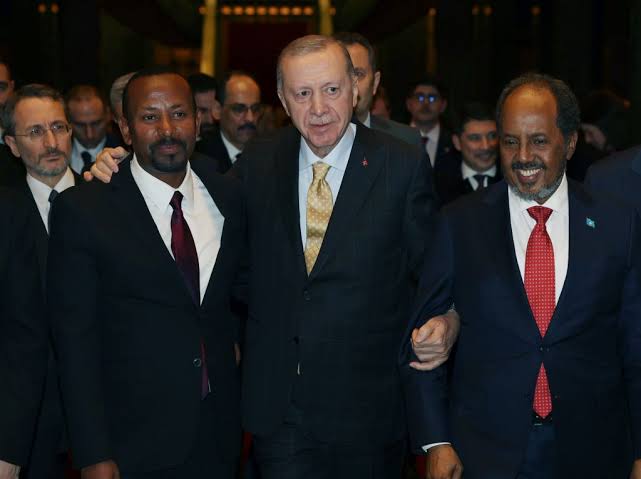Facebook Twitter (X) Instagram Somali Magazine - People's Magazine
Somalia and Ethiopia remain committed to advancing peace and cooperation under the Ankara Declaration despite a violent clash in the Somali border town of Doolow. The deadly confrontation, which occurred just a day before high-level diplomatic talks in Addis Ababa, threatened to derail progress made earlier this month.
Ethiopia’s State Minister for Foreign Affairs, Ambassador Mesganu Arga, and Somalia’s State Minister for Foreign Affairs, Ali Mohamed Omar, met on Tuesday to reaffirm their nations’ dedication to the agreements signed in Ankara on December 12. Their discussions emphasized strengthening bilateral ties and maintaining stability in the Horn of Africa, a region often plagued by insecurity and political tensions.
Deadly Clashes in Doolow Spark Tensions
The Somali government has accused Ethiopian troops, operating under the African Union Transition Mission in Somalia (ATMIS), of attacking Somali military bases in Doolow on Monday morning. According to Somalia’s Ministry of Foreign Affairs, the assault targeted the army, police, and intelligence facilities, resulting in multiple casualties.
Jubaland officials, however, presented a conflicting account. They alleged that Ethiopian forces intervened to protect local politicians after Somali federal troops attempted to shoot down a plane carrying members of the Jubaland government.
“The incident escalated into a firefight, leading to injuries and the disarmament of federal forces,” said Jubaland Security Minister Yusuf Hussein Osman during a press conference. Witnesses described intense clashes spreading through the town before Somali forces were overwhelmed.
The Ankara Declaration and Its Challenges
The Ankara Declaration, brokered by Turkey, aims to resolve longstanding disputes between Ethiopia and Somalia. Signed earlier this month, the agreement focuses on mutual respect for sovereignty, economic collaboration, and coordinated security efforts.
Monday’s border violence, however, underscores the fragility of relations between the two nations. Territorial disputes and diverging regional interests have long strained ties, with this recent clash adding to the list of challenges.
Earlier this year, tensions flared when Ethiopia signed an agreement with Somaliland to lease the Berbera port. Mogadishu viewed the deal as a violation of its sovereignty, further complicating its relationship with Addis Ababa.
Commitment to Dialogue and Cooperation
Despite these setbacks, both nations appear determined to move forward. During Tuesday’s meeting, Ambassador Mesganu emphasized the importance of collaboration, stating, “The interdependence of our nations makes cooperation imperative.” His Somali counterpart echoed this sentiment, reiterating Somalia’s dedication to the Ankara agreements.
Observers stress that addressing the root causes of conflict will be essential for the success of the Ankara Declaration. This includes fostering trust, ensuring accountability, and prioritizing dialogue to prevent future clashes.
The Road Ahead for Somalia-Ethiopia Relations
The Ankara Declaration marked a pivotal moment for Ethiopia and Somalia, particularly as it offered Ethiopia, a landlocked nation, access to Somali ports. However, the complexities of implementing such agreements in a region marked by mistrust and competing interests remain evident.
Analysts warn that without sustained efforts to build trust and resolve territorial disputes, progress could be undone. Both governments have pledged to continue dialogue, with Ethiopia reaffirming its commitment to “revitalizing and deepening fraternal relations.”
As tensions linger, the Horn of Africa faces a critical test. The ability of Somalia and Ethiopia to navigate these challenges will determine whether the Ankara Declaration becomes a foundation for lasting peace or another failed attempt at regional stability.
Key Takeaways and Hashtags
Somalia and Ethiopia reaffirm commitment to Ankara Declaration amid Doolow clash.
Clashes highlight the fragility of Somalia-Ethiopia relations.
Bilateral ties strained by territorial disputes and diverging interests.
Observers stress the need for dialogue and accountability.

